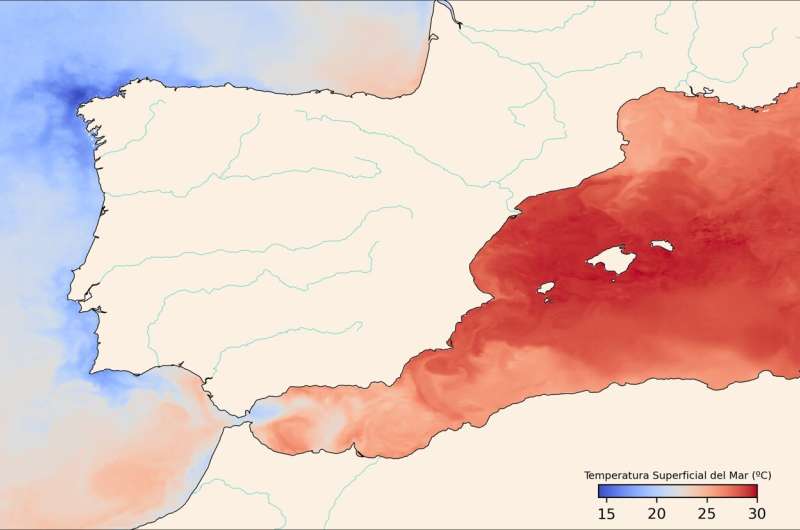This article has been reviewed according to Science X's editorial process and policies. Editors have highlighted the following attributes while ensuring the content's credibility:
fact-checked
peer-reviewed publication
trusted source
proofread
A study reframes the definition of marine heatwaves to improve responses to climate change

Ocean heating leads to intense marine heatwaves that can be extremely harmful for marine ecosystems, especially on ocean surfaces. A study from the Mediterranean Institute for Advanced Studies (IMEDEA-CSIC-UIB), a joint center of the Spanish National Research Council (CSIC) and the University of the Balearic Islands (UIB), proposes reviewing and amending the definition for marine heatwaves.
Given today's gradual warming and definition, marine heatwave forecasts in the Mediterranean will cover almost the entire year by 2050. The research opens up a new realignment horizon for climate indicators to adapt to the reality of climate change today. The work was recently published in the journal Frontiers in Marine Science.
A marine heatwave is an extreme event defined as a period where sea temperature in a specific region is abnormally warm. Nonetheless, "we need to be careful with what we deem abnormal since we are living in a time of climate transition, where climate variables do not remain constant in the long term and are trending upwards. In this vein, the impact is particularly stark in the Mediterranean where surface temperature is heating at a rate of nearly 0.5ºC per decade," explains Pere Rosselló, lead author of the paper.
Marine heatwaves in the Mediterranean Sea are stronger in the summer, setting new highs year-on-year. The heatwaves impact different types of marine life, such as Mediterranean seagrass (Posidonia oceanica). This plant is crucial for the Mediterranean's ecosystem, where temperatures often exceed limits the seagrass can stand and, in this way, place its very survival at risk.
Paradigm shift
With a view to predicting the number of heatwaves in the Mediterranean using climate models, the team of scientists noted an inconsistency: the current definition forecasts heatwaves throughout the entire year by 2050 given ongoing gradual heating in the Mediterranean. This led them to rethink the premise of the paper and propose the definition be updated.
Current rules for defining heatwaves comprise taking a 20- to 30-year benchmark climate period from the start of the 1980s (when satellites began measuring sea-surface temperature). Global and regional studies have been published using this methodology that point to permanent heatwaves in the coming decades.
Nevertheless, Pere Rosselló points out that "by starting with the premise of a heatwave being an extreme event, we believe these conclusions are slightly misleading and jeopardize the use of this indicator: instead of reflecting a period of extreme temperatures, it would only reflect the known gradual increase in temperatures while labeling it an extreme event."
This is why researchers propose a narrower definition for heatwaves, using flexible rather than historic reference periods, in line with other scientific studies. For example, this would mean using the period between 2000 and 2019 to analyze heatwaves in the year 2020. This approach includes the underlying heating in benchmark periods and keeps the rare nature of these extreme events constant.
The group of scientists used both satellite data and predictive climate models up to the year 2100 in order to cement and visualize their hypothesis. In this sense, the parallel analysis underscores the need to reinterpret marine heatwaves and provide a basis to better understand the pace of climate change.
The research opens up a new realignment horizon for climate indicators to adapt to the reality of climate change. This could lead to more precise and contextualized understanding of extreme events such as marine heatwaves, while improving responses to mitigate and adapt to climate challenges.
More information: Pere Rosselló et al, Assessing marine heat waves in the Mediterranean Sea: a comparison of fixed and moving baseline methods, Frontiers in Marine Science (2023). DOI: 10.3389/fmars.2023.1168368
Journal information: Frontiers in Marine Science
Provided by Spanish National Research Council




















